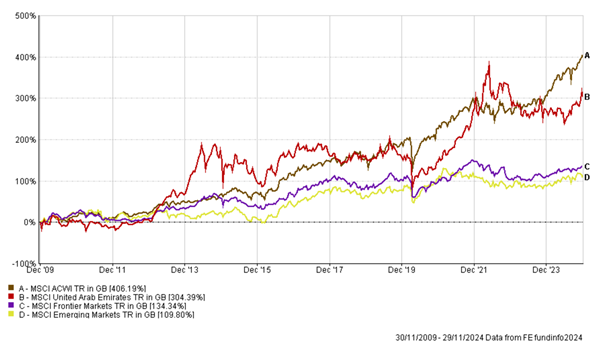As our first weekly update as a Titan Wealth company, we thought this was a good opportunity to write an update based on a recent trip to we took to Dubai.
Last month, some of our Guernsey discretionary team visited Dubai to meet with some of our new colleagues from another Titan Wealth business following the acquisition. This visit also provided a valuable opportunity to shift our investment focus from traditional, developed markets and explore the investment prospects within Dubai and the wider United Arab Emirates.
Dubai is the most populous city in the UAE and serves as the capital of the Emirate of Dubai, one of the seven emirates that originally formed the UAE in 1971. As a major economic hub in the region, the city boasts one of the fastest-growing economies, outpacing both emerging and developed markets. In line with its ambitious Economic Agenda for 2033, Dubai aims to double its economy over the next decade.
As of 2024, Dubai's population stands at approximately 3.79 million, with expatriates constituting around 90% of the population. This demographic mix reflects Dubai's globalised nature, where Western values coexist with rich Islamic traditions that form the cultural fabric of the UAE.
One of the most attractive aspects of Dubai, and the UAE more broadly, for investors—particularly those from the expatriate community—is its favourable tax regime. The absence of income tax, capital gains tax, and inheritance tax makes Dubai a highly attractive destination for high-net-worth individuals and investors looking to grow and preserve wealth. Additionally, the city's Free Zones offer substantial incentives, including tax exemptions and the ability for foreign nationals to retain full ownership of businesses, further enhancing its appeal as an investment hub.
Dubai’s rapid development has positioned it as a leader in the global investment landscape, particularly with the launch of country-specific indices such as the Nasdaq Dubai UAE Index, and its role in developing market exchanges. The UAE’s classification as a secondary emerging market by FTSE Russell—above more speculative frontier markets—provides significant growth potential for investors looking beyond traditional developed markets, with the following performance of regional markets illustrating the potential of the wider region:

Since the end of 2009, the UAE index has demonstrated a strong upward trend, delivering a remarkable 304.4% return, significantly outperforming both the MSCI Emerging Markets index (109.8%) and the more volatile Frontier Markets index (134.3%) in sterling terms. The frontier market index covers less established emerging regions and includes other countries such as Nigeria and Sri Lanka. While the UAE index has experienced periods of relative underperformance, linked in the main to property concerns and geopolitics associated with oil and gas, it notably outperformed in early 2013, continued its strong performance through 2019, and again outperformed in 2021.
As with many emerging markets, the underlying constituents of the UAE index are largely uncorrelated with broader global equity benchmarks, resulting in varying performance patterns across different periods – acting as a diversifier across portfolios. For instance, in 2007, the UAE index delivered an approximate return of 36% compared to around 10% for the World Equity Index, 86% in 2013 versus 21%, and 52% in 2021 versus 20%. On a more consistent basis, the UAE index outperformed in 80 months and underperformed in 101 months over the entire period.
As we continue to explore diverse investment opportunities, it is clear that emerging markets, including those in the UAE and Dubai, present significant growth potential for longer-term investors. That said, we know there are no guarantees in investing, and past performance is not an indicator of future performance. Across our capital growth-focused portfolio, we do maintain an allocation to the Middle East through specialist third-party fund managers. For example, in the Ashmore EM Frontier Fund, the UAE region holds a 14% exposure, where traditional financial services and wealth managers dominate, with key names like Dubai Islamic Bank, Abu Dhabi Islamic Bank and Emaar Properties. Other exposures cover manufacturing, telecommunications and transportation.
As the above illustrates, there are fast growing investment opportunities, not only in the UAE but other emerging and frontier markets across a variety of investment sectors, from consumption to finance and infrastructure. This long-term theme continues to play a role across all our investment strategies from both a return and diversification perspective.


